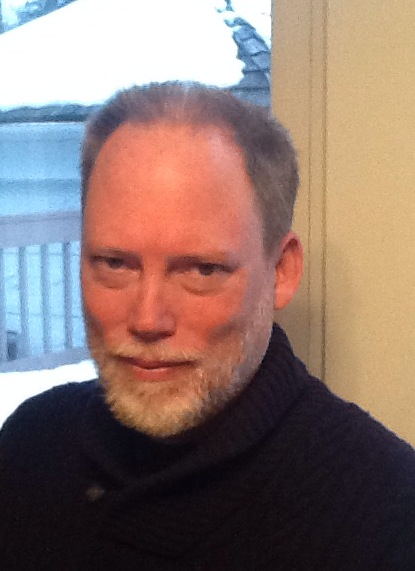Contributor Spotlight: James Barnett
 James Barnett’s pieces “Gathering of Cranes” and “Last Hurrah” appear in Midwestern Gothic Issue 17, out now.
James Barnett’s pieces “Gathering of Cranes” and “Last Hurrah” appear in Midwestern Gothic Issue 17, out now.
What’s your connection to the Midwest, and how has the region influenced your writing?
I am a native Californian, but I love the Midwest. Ever since I first crossed the Rockies on my move to Chicago, I have been fascinated by it. I live here. Work here. Vacation here. It is my home. If I have a calling as a poet, it is to tell stories about this place.
What do you think is the most compelling aspect of the Midwest?
If I express my true feelings about living here, most people think I am strange, in a very un-Midwestern kind of way, as what I say doesn’t seem at all pragmatic to them. You mean, I didn’t leave the land of endless summer for a job, an assignment, or a woman? I did it because I actually prefer living here? It is a conversation ender. So I mostly keep this kind of thing to myself.
But since you asked, I find the drama of continent-sized forces colliding into one another compelling, as well as how everything living on this land is part of the drama. As a corollary, I am fascinated by how we (meaning human beings) created our own massive structures, from the skyscrapers and factories to the row crops stretching from horizon to horizon, and what happens to the works of man when they are left to decay. More than anywhere I have ever been, I grasp a sense of both our future and our past when I wander around the Midwest.
How do your experiences or memories of specific places – such as where you grew up, or a place you’ve visited that you can’t get of your head – play a role in your writing?
Well put. That’s pretty much the beginning of everything for me.
Discuss your writing process–inspirations, ideal environments, how you deal with writer’s block.
I have been a working writer for most of my adult life: Journalist, music reviewer, writing teacher, commodities analyst. I have spent countless hours writing well-crafted crud. I have been a slave to a seemingly never-ending series of deadlines.
Poetry is different. There is almost no money to be made writing poetry. And that is liberating, at least to me. There is no hot breath on my neck, no one looking over my shoulder with money in the game. Now that I am writing poems, I try to be more aware of my surroundings, to be keen, to mine my memories for something besides nostalgia or pity. And if I don’t like what I’ve written, I move on. No harm done. Admittedly, I am early in this process. Will writer’s block or a lack of inspiration be a problem down the road? Maybe. But right now, I have far more ideas than I have time to write them down.
How can you tell when a piece of writing is finished?
I’m still learning that. I’ve tried to not be so in love with my words, to be ruthless with them at times, to persevere. Like a lot of budding poets, I have a mentor of sorts who has helped me get better at this. So I’d like to give a quick shout out to Lina Chern for her sympathetic and inquisitive ear.
Who is your favorite author (fiction or poet), and what draws you to their work?
I credit Louise Gluck with getting me to write poetry again. About three years ago, I was supposed to watch a movie with some friends at Webster Place, but I got there after them, and the movie was sold out. So I went next door to the Barnes and Noble and waited for my friends. While browsing through the aisles, I began reading a copy of Gluck’s “The Wild Iris.” I loved it. Her poems tell little stories about life, nature, God. Powerful things are being said, but in a way that fuses language with the irrational, where obvious explanation remains elusive. Right there, under the bright florescence, these poems renewed my faith in poetry as a tonic for the contemporary age. My desert island pick would probably be “Leaves of Grass,” Whitman’s elemental yawp into the wilderness, but “The Wild Iris” removed the blinders from my eyes. And thank the merciful gods of capitalism for sparing at least a few brick-and-mortar bookstores where these little miracles still happen.
What’s next for you?
To keep writing poems in my basement after the kids go to bed. There is a paperweight on my desk that reads, “What would you attempt to do if you knew you could not fail?” Over the years, there have been a lot of answers to that question, but right now my answer is this.
Where can we find more information about you?
You can reach me on Twitter @saucycredo






